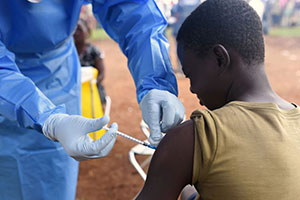It has been decided to conduct the vaccination against the Ebola disease for health workers.
This has been announced by the Government through the Ministry of Health, that the vaccination will target front line workers in the fight against Ebola.
As the widespread occurance continues to claim more lives in neighbouring DRC.
As neighbour to the DRC, Uganda is on high risk alert due to the high risk of the Ebola threat.
In August 2018, Ebola Virus Disease (EVD) outbreak was confirmed in the Democratic Republic of Congo (DRC).
It is currently affecting north-eastern province of DRC that border Uganda, Rwanda and south Sudan.
As of 1st November 2018, the DRC had registered a total of 285 increasing cases, 250 confirmed cases and total of 180 deaths.
Currently about 41 suspect cases are under investigation.
The two provinces that are affected are North Kivu – Mabalako; Butembo; Ocha; Musienene; Beni and Bingo and Ituri- Mambasa, Mandina, Tchomia.
The affected areas in the DRC are about 100km from the Uganda’s border districts of Kabaraole, Bunyangabo, Kasese, Bundibugyo, Hoima, Arua and Ntoroko.
The Search for active case continues in all communities, health facilities and in formal and informal border crossing in all districts, mostly in the high risk ones.
In order to prevent the spread of this disease, the trainings on case management have been conducted in 7 districts of Kabaraole, Bunyangabo, Kasese, Bundibugyo, ntoroko, wakiso and Kampala.
Meanwhile, the Ministry has again repeated that there is no confirmed case of Ebola registered in Uganda yet.
But this vaccination programme will help the front line workers to get the better services and treatment against the ebola disease.


